Election 2015: How feasible would it be to introduce online voting?
- Published
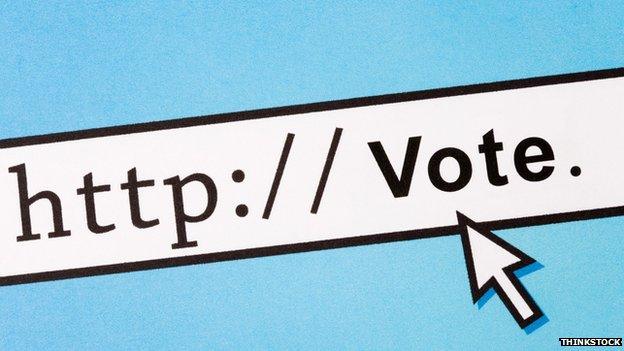
People can shop, date and bank online. How feasible would it be to allow internet voting at the general election?
Imagine democracy had just been invented. Would the UK government decide to set up 50,000 polling stations on Thursday 7 May? Or would the vote be taking place online instead?
Until the 1870s those people allowed to vote did so openly with no privacy.
The 1872 Ballot Act changed this with the invention of the "modern" polling station - the church hall with its wooden booths, a pencil on string and piles of ballot papers handed out by earnest election workers. Since then the way we vote has hardly changed.
Today people shop, find a partner and bank online. Surely voting online is possible? The government says not.
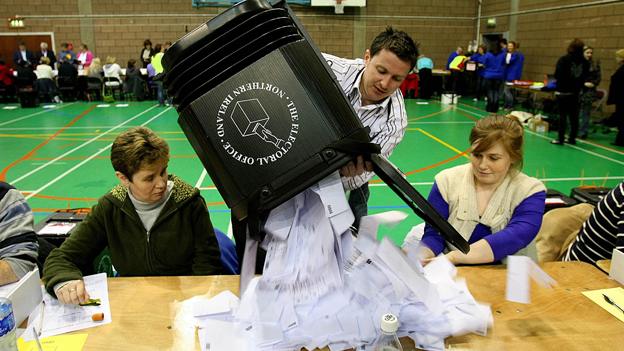
The 2010 count: Little has changed in the way the UK votes since 1872
In January, Sam Gyimah, the constitution minister, told the House of Commons: "I feel [that] moving to electronic voting would be a huge task for any government. We can't be under any illusion that this would be easy to achieve." Remote voting was "incredibly rare" around the world and would require a "very robust and secure" system, Gyimah said.
Instead effort has been focused up to now on online registration, at a cost of £100m.
Advocates for voting reform are unimpressed. "It's crazy that in 2015 we're expecting young people to queue up to tick a box on a bit of paper," Rick Edwards, presenter of BBC Three's Free Speech, said last year. "Young people are digital natives. We've got to take voting to where they are."
Jamal Edwards, a 24-year-old entrepreneur who set up TV station SBTV, agrees. He didn't vote at the last election and may not do so this time. E-voting would boost turnout among his generation, he says. "It is more accessible and means people would engage. I think we have the technology it's just we have to push for it."
Up to now electronic voting has tended to mean the use of electronic voting machines in polling stations. The US, Venezuela and India have used them. The machines speed up the counting but have little impact on convenience - voters still need to turn up.
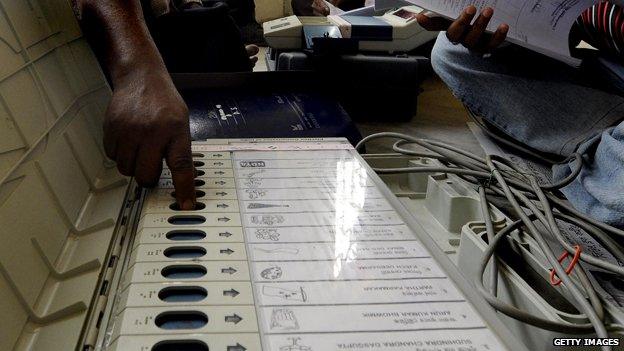
An electronic voting machine in India
The real shift would be remote e-voting, which would mean being able to vote online rather than go to a polling station. And some are wary. "Voting from home and not behind a curtain in a public place may mean that for certain kinds of people in society their votes may be coerced or bought," Wikipedia founder Jimmy Wales warned.
But Switzerland, Australia and Alaska all use online voting in a small way or have plans to bring it in.
And one country - Estonia - has been using it in all elections for a decade. The small Baltic state - population 1.3m - introduced it in October 2005. At that first election just 1.9% of votes were submitted online. But at each subsequent poll, external the proportion voting online has grown, reaching 30.5% in March's parliamentary election.
In contrast, the UK has altered little since 1872. The only significant recent change, the Representation of the People Act 2000, external, has made postal voting available to anyone who demanded it.
The high water mark at general elections came in 1950 when turnout reached 84%. Last year's referendum in Scotland's in which 84.6% voted is a rare case of mass participation. But that was a yes-no vote on a nation's constitutional future, not a run-of-the-mill party political contest.
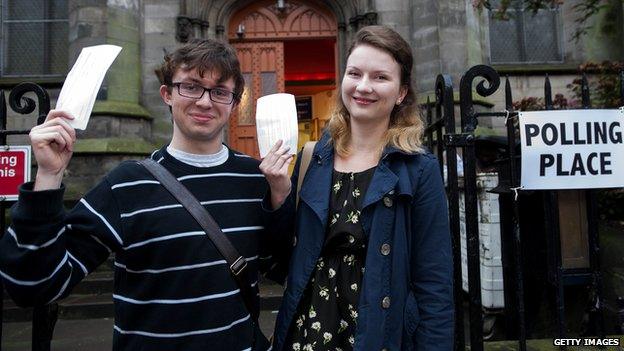
Old fashioned voting techniques didn't deter a high turnout in last year's Scottish referendum
Turnout for Westminster elections really began to tail off after 1992, external. Over the last three general elections the percentage voting has averaged 62%.
Worries about turnout harden when one looks at younger voters. In 2010, 44% of 18 to 24-year-olds voted compared to 65% of the whole electorate - a difference of 21%. Jeremy Paxman has called for voting to be made compulsory, external, but the idea of forced voting in a democracy is inevitably controversial.
Online voting is popular in Estonia. So has it raised turnout?
It's a complicated question to answer. Turnout actually fell at the first opportunity voters had to use e-voting, the 2005 local election, when compared with the previous local election. However, the first parliamentary election to have e-voting - in 2007 - saw a small rise on the previous parliamentary election.
Turnout is influenced by factors such as political scandals, weather and the closeness of the contest, says Priit Vinkel, chief of staff at the Estonia's National Electoral Committee. It makes it hard to compare participation before and after online voting was introduced.
Since 2005, turnout is generally up - but it is impossible to know if that is due to allowing people to vote online. You can ask online voters if they would have bothered to vote otherwise but even that is just a guess.
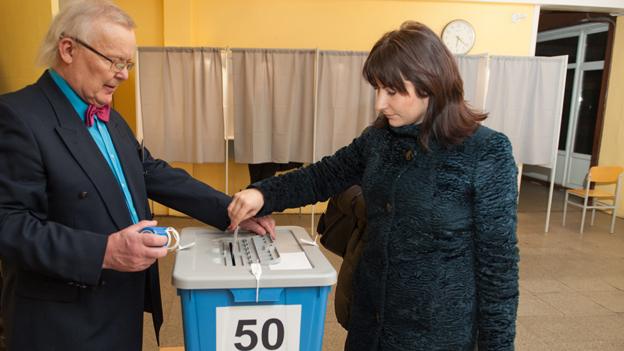
Estonians have had the option of online voting since 2005
Analysis of the 2005 vote found that 4.9% of voters said they definitely would not have voted without internet voting, and 13.6% say they probably would not have done. A report for the Council of Europe, external in 2010 estimated that turnout in the previous year's local election would have been "up to 2.6% lower in the absence of internet voting".
The real impact is on "borderline" voters, Vinkel says. People with disabilities, the elderly, voters abroad, and those living more than 30 minutes from a polling station all used e-voting more than average. Perhaps surprisingly, there is no evidence it boosts turnout among young voters.
"There's always people who think nothing should be done," Vinkel says. "The convenience factor is one of the most important things. People say it just saves their time."
The main argument against is security. Without the privacy of a polling booth, people could be forced or bribed to vote a certain way, critics argue.
The Estonian system sets out to prevent this by allowing people to vote multiple times, with only the last vote being registered.
There's another more sinister possibility - that the whole online electoral apparatus could be hacked and the result manipulated or discredited.

E-voting at-a-glance
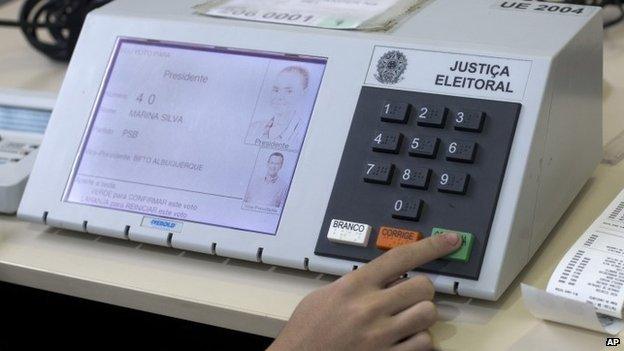
Electronic voting began in the 1960s with the use of punched card systems
More modern systems include electronic machines in polling stations operated by buttons or touchscreens which connect to a central database
Countries using forms of e-voting include the US, Brazil (pictured above), Belgium, Estonia, the Philippines and India
The term "e-voting" includes online voting where electors can cast their ballot from any computer using a secure ID

All Estonians get a government ID and scannable chip and PIN, external that gives them an online identity. There are special SIM cards for authenticating your identity from a mobile phone.
Once cast, the votes are encrypted. But even with these safeguards, computer scientists at the University of Michigan last year concluded, external that the system was vulnerable to hacking and should not be used for European elections.
Mark Ryan, professor of cyber security at the University of Birmingham, says online voting is very different from online banking, for instance. With banking you can verify a transaction, whereas voting is not checkable in the same way - it is a private matter, he says.
Also, if there is a mistake in online banking, money can be returned later. If hacking was found to have occurred a week after an election "it's a bit of a disaster" - would the result have to be reversed? And the stakes are far higher.
"Let's say that you're voting for president of the US. You could have Russians or Chinese with an interest in the outcome [trying to manipulate it]." Foreign powers hacking each other's networks is a growing phenomenon. "The risk we can't afford to take is large scale interference by a foreign state. GCHQ and MI5 believe the UK is under cyber attack from foreign countries."
That's not to say online voting won't happen, Ryan says. A recent survey, external found one in six people thought that voting via smartphone or tablet would increase turnout. And the digital democracy commission set up by Commons Speaker John Bercow has recommended that the next election in 2020 incorporate e-voting.
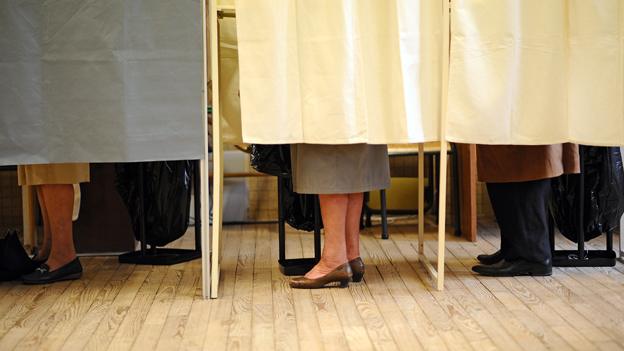
No substitute for turning up and marking a box with a cross?
Ryan thinks that's too soon. "I don't think we can be confident about the system by then. Perhaps in 10 years, though." Quite how remains to be seen - would every online voter need to apply for a handheld chip and pin verification device? Distributing them would cost about £5 each which might prove too expensive - "elections are run on a pretty tight budget", he says.
Some would ask whether democracy should be "made easy". According to this view, voting demands making the effort to play your part as a citizen. Supporters might add that the ritual of turning out to vote in a sun-dappled classroom or village hall every five years is a rare moment of national togetherness.
Others counter that new methods trump tradition. "The key is to get people voting," Edwards says. "If that means an app then it should be seriously considered."

More from BBC Online
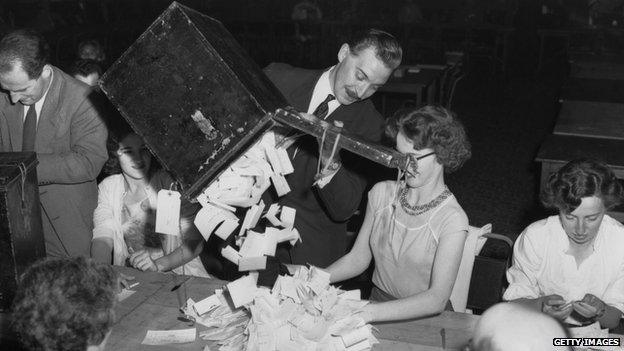
Hustings, ballot boxes, election broadcasts, the leaders of two mighty parties battling it out for the "keys to Number 10". Why does so much about the general election seem to belong to a bygone era?

Subscribe to the BBC News Magazine's email newsletter to get articles sent to your inbox.